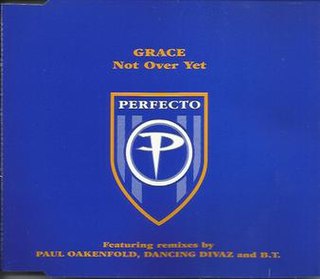
"Not Over Yet" is a song by British dance act Grace. Originally released in 1993 under the band name State of Grace, it was re-released in March 1995 as the first single from their only album, If I Could Fly (1996). It received critical acclaim from music critics, peaking at number six on the UK Singles Chart and number-one on the US Billboard Hot Dance Music/Club Play chart. Lead vocals and backing vocals were performed by singer Patti Low. In 1995, the lead vocals were replaced by new frontwoman and singer, Dominique Atkins for the album release, although Low's backing vocals remained in place. This Atkins/Low combination appeared on all subsequent re-releases and remixes of the track. The woman who appears in the accompanying music video is Low.
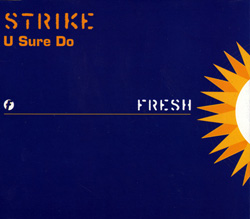
"U Sure Do" is a song by British dance music group Strike. Released in December 1994 by Fresh Records, it was their second single and reached number 31 in the UK charts. The song was a big UK club hit and after receiving regular play in clubs throughout 1994/1995 it was re-released and re-entered the chart in April 1995, reaching number four. It also peaked at number-one on the UK Dance Singles Chart. In 1997, it was featured on the group's only album, I Saw the Future.

"He's on the Phone" is a song by British pop group Saint Etienne in collaboration with French singer-songwriter Étienne Daho, released in October 1995 by Heavenly and MCA as a single from their third compilation album, Too Young to Die (1995). A fast-paced dance track, it is one of Saint Etienne's biggest hits, reaching number 11 on the UK Singles Chart, number 31 in Iceland, number 41 in Sweden and number 33 on the US Billboard Dance Club Songs chart. The lyrics tell of an "academia girl" trying to escape from a relationship with a married man: He's on the phone / And she wants to go home, / Shoes in hand, / Don't make a sound, / It's time to go. At the centre of the track is a spoken-word section by Daho.

"You Never Love the Same Way Twice" is a song by Zambian-born singer Rozalla, released in October 1994 as the third single from her second album, Look No Further (1995), and later also included on her Best Of album. The song reached number 12 on the Scottish Singles Chart and number 16 on the UK Singles Chart, during a five-week chart run. It was a minor hit in Germany and Iceland, and peaked at number 61 on the Eurochart Hot 100 in November 1994. The single was also released in the United States in 1995 as the attendant single of the US edition of her second album, reaching number 11 on the Billboard Hot Dance Club Play chart. In 2005, Rozalla re-recorded and re-released the track for a German label.

"Two Can Play That Game" is a song by American R&B singer-songwriter Bobby Brown from his third album, Bobby (1992). The single release was remixed by K-Klass and originally reached No. 38 on the UK Singles Chart in June 1994. In April 1995, it re-entered the chart, peaking at No. 3. It received positive reviews from music critics and also reached No. 3 in the Netherlands. Additionally, it became a top-20 hit in Belgium, Denmark, Finland, Ireland, and Italy. On the Eurochart Hot 100, "Two Can Play That Game" peaked at No. 10. This version of the song appeared on Brown's remix album of the same name, released later in 1995.

"I've Got a Little Something for You" is a song by British R&B group MN8. It was released on 23 January 1995 by Columbia and 1st Avenue as the lead single from their debut album, To the Next Level (1995). The song was written by Mark Taylor and was produced by Dennis Charles and Ronnie Wilson. It peaked at number two on the UK Singles Chart, reached number three in France and New Zealand, and charted within the top 10 in eight other territories, including Australia, Ireland, Norway, and the Wallonia region of Belgium.

"Think of You" is a song recorded by Italian Eurodance project Whigfield, which was performed by Danish-born Sannie Charlotte Carlson. It was released in May 1995 as the third single from her first album, Whigfield (1995), and scored success on the charts in Europe. The single reached number seven in the UK and was a top 10 hit also in Canada, Denmark, Iceland, Ireland, Italy, Lithuania, the Netherlands, Spain and Zimbabwe. On the Eurochart Hot 100, "Think of You" reached number four.

"Impossible" is a song by German musician Captain Hollywood Project. It was released in October 1993 by labels Blow Up and Intercord as the fourth single from his debut album, Love Is Not Sex (1993), and features vocals by American singer Kim Sanders. The song was co-written by Nosie Katzmann and Tony Dawson-Harrison, and became a notable hit in several countries. But like "All I Want", it achieved moderate success in comparison with the two previous Captain Hollywood Project's singles, "More and More" and "Only with You". A music video was produced to promote the single, featuring Petra Spiegl instead of Sanders.

"Catch a Fire" is a song by Trinidadian-German musician Haddaway, released on July 31, 1995 as the second single from his second studio album, The Drive (1995). It is written by Dee Dee Halligan, Richard W. Palmer-James and Junior Torello, and produced by Halligan and Torello. The song was the last major Haddaway hit in several countries, particularly in Israel, Belgium (Flanders), where it reached the top 10. It also peaked at number 12 in Finland and number 17 in the Netherlands. On the Eurochart Hot 100, it reached number 43. For the first time, a Haddaway song was not released in France.

"Surrender Your Love" is a song recorded by British house music group Nightcrawlers, released in May 1995 by Final Vinyl and Arista Records as the second single from their only album, Lets Push It (1995). Produced by American DJ and record producer MK, the song is co-written by him with John Reid and was released shortly after the previous single, "Push the Feeling On". It became a hit in various countries, such as the UK, Finland, France and the Netherlands, where it reached the top 10. On the Eurochart Hot 100, it peaked at number 19 in June 1995. Outside Europe, the song was successful in Israel, peaking at number eight.

"I Don't Wanna Be a Star" is a song by Italian band Corona, released in November 1995 as the fourth and final single from their debut album, The Rhythm of the Night (1995). It was a club hit in many European countries, but unlike the previous Corona singles, it has disco sonorities. The song peaked at number one in both Italy and Spain, number five in Hungary and number six in Finland. In the UK and on the Eurochart Hot 100, it peaked within the top 30. It was Corona's last major hit.

"Move Your Ass!" is a song by German band Scooter, released in January 1995 as the second single from their first studio album, ...and the Beat Goes On! (1995). In October of the same year, a Move Your Ass EP was marketed in the United Kingdom and Ireland. This rave song was a hit in countries such as Austria, the Netherlands, Germany, Norway, Sweden and Switzerland where it reached the top ten. In France, the song reached number 11.
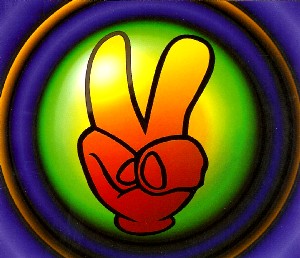
"Turn On, Tune In, Cop Out" is a song by Norman Cook's acid jazz group Freak Power, released in October 1993 by Island Records and 4th & Broadway as the debut single from their first album, Drive-Thru Booty (1994). The song features a smooth jazz sound and the baritone vocals of lead singer Ashley Slater. The single originally charted at number 29 in the United Kingdom. However, two years later, the song was used in the popular Levi's advertisement "Taxi", and it was re-released on 6 March 1995. This time, the single was a success, reaching number three on the UK Singles Chart and becoming the group's only top-20 hit. The song was also a moderate hit in western Europe and New Zealand.

"Heartbeat" is a song by Scottish pop singer-songwriter Jimmy Somerville, formerly the lead vocalist of the bands Bronski Beat and Communards. Released in January 1995 by London Records as the first single from his second solo album, Dare to Love (1995), it peaked at number 24 on the UK Singles Chart in February of that year and reached number in his native Scotland. The song also topped the US Billboard Hot Dance Club Play for one week in April 1995, becoming Somerville's first and only solo number one on that chart. Backing vocals on the song are performed by American dance music singers Shawn Christopher and Yvonne Gage. The accompanying music video for "Heartbeat" was filmed in black-and-white.
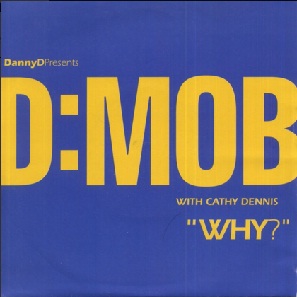
"Why" is a song by British music producer and remixer D Mob featuring singer-songwriter Cathy Dennis. It was released by FFRR as the fourth single from Dennis's second album, Into the Skyline (1992), a full year after her previous single from the album. In the UK, it reached number 23 on the UK Singles Chart, number seven on the UK Dance Singles Chart and number one on the UK Club Chart, making it the most successful single from the album. "Why" was dedicated in memory of Philip Hall, who died in December 1993.

"Son of a Gun" is the debut single of British dance music DJ Jake Williams, released under the name JX. It was released in March 1994, reaching number six in the United Kingdom and Australia and number 35 in the Netherlands. The song contains samples from the 1976 song "Touch and Go" by Ecstasy, Passion & Pain featuring Barbara Roy. Two different music videos were made to promote the single. The Top Ten chart success of "Son Of A Gun" in Australia was very much, almost solely, due to a community radio station in Melbourne, 98.9 North West FM. The station instantly identified the hit quality of the song and immediately added the song to the station's playlist on high rotation, and also incorporated grabs of the song in station IDs, "cue to call" promotions and other program elements. This almost saturation exposure of the song not only brought the song to the attention of the station's listeners, but also forced the hand of other Melbourne radio stations to add the song to their own playlists, some taking a full three months after North West FM's debut.
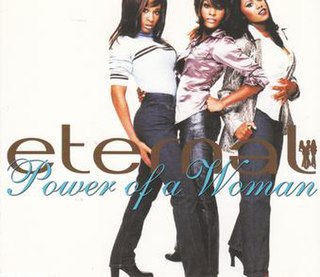
"Power of a Woman" is a song by British R&B girl group Eternal. It was written by the songwriting duo of Carl Sturken and Evan Rogers, and was released in October 1995 by EMI United Kingdom and 1st Avenue as the first single from the group's second studio album, Power of a Woman (1995). It was also their first release as a trio after the departure of Louise Redknapp. "Power of a Woman" peaked at number five on the UK Singles Chart and became the group's fifth top-10 single. In Australia, the song became the group's second top-10 single, reaching number eight in April 1996. Its music video was directed by Randee St. Nicholas.

"Tell Me the Way" is a song by Italian musical group Cappella, released in July 1995 as the first single from their third studio album, War in Heaven (1996). It features new singer Alison Jordan, who replaced Kelly Overett after she left the group. The song was a hit in many European countries, peaking at number eight in Italy, number 15 in Finland, number 17 in the UK and number 20 in the Netherlands. On the Eurochart Hot 100, it reached number 33.

"Don't Let the Feeling Go" is a song by British house music group Nightcrawlers and released in August 1995 by Arista, BMG and Final Vinyl as the third single from the group's only album, Lets Push It (1995). The song is produced by American DJ and record producer MK, and written by John Reid with Kinchen and Graham Wilson. In the UK, it peaked at number 13 during its first week on the UK Singles Chart, on 9 September 1995. "Don't Let the Feeling Go" became a hit also in other countries, such as Finland, where it peaked at number five, and in Belgium, Ireland, Scotland, Sweden and Switzerland, where the single reached the top 30. Its music video was directed by Guy Ritchie.
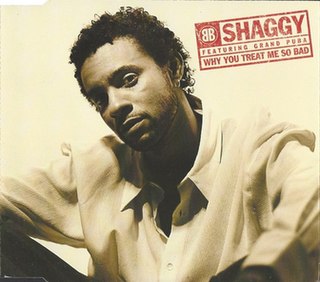
"Why You Treat Me So Bad" is a song by Jamaican-American reggae musician Shaggy featuring American rapper and emcee Grand Puba. It was released in 1995 as the second single from his third studio album, Boombastic (1995), and contains elements from "Mr. Brown" by Bob Marley. It was a notable hit in several countries, including Ireland, Italy, the Netherlands, New Zealand, and the UK, where it peaked at number 11.




















